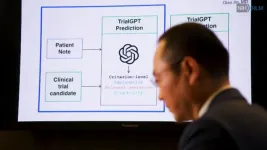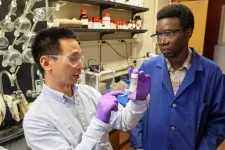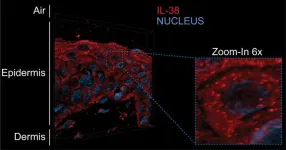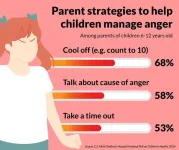(Press-News.org) Researchers from the National Institutes of Health (NIH) have developed an artificial intelligence (AI) algorithm to help speed up the process of matching potential volunteers to relevant clinical research trials listed on ClinicalTrials.gov. A study published in Nature Communications found that the AI algorithm, called TrialGPT, could successfully identify relevant clinical trials for which a person is eligible and provide a summary that clearly explains how that person meets the criteria for study enrollment. The researchers concluded that this tool could help clinicians navigate the vast and ever-changing range of clinical trials available to their patients, which may lead to improved clinical trial enrollment and faster progress in medical research.
A team of researchers from NIH’s National Library of Medicine (NLM) and National Cancer Institute harnessed the power of large language models (LLMs) to develop an innovative framework for TrialGPT to streamline the clinical trial matching process. TrialGPT first processes a patient summary, which contains relevant medical and demographic information. The algorithm then identifies relevant clinical trials from ClinicalTrials.gov for which a patient is eligible and excludes trials for which they are ineligible. TrialGPT then explains how the person meets the study enrollment criteria. The final output is an annotated list of clinical trials—ranked by relevance and eligibility—that clinicians can use to discuss clinical trial opportunities with their patient.
“Machine learning and AI technology have held promise in matching patients with clinical trials, but their practical application across diverse populations still needed exploration,” said NLM Acting Director, Stephen Sherry, PhD. “This study shows we can responsibly leverage AI technology so physicians can connect their patients to a relevant clinical trial that may be of interest to them with even more speed and efficiency.”
To assess how well TrialGPT predicted if a patient met a specific requirement for a clinical trial, the researchers compared TrialGPT’s results to those of three human clinicians who assessed over 1,000 patient-criterion pairs. They found that TrialGPT achieved nearly the same level of accuracy as the clinicians.
Additionally, the researchers conducted a pilot user study, where they asked two human clinicians to review six anonymous patient summaries and match them to six clinical trials. For each patient and trial pair, one clinician was asked to manually review the patient summaries, check if the person was eligible, and decide if the patient might qualify for the trial. For the same patient-trial pair, another clinician used TrialGPT to assess the patient’s eligibility. The researchers found that when clinicians use TrialGPT, they spent 40% less time screening patients but maintained the same level of accuracy.
Clinical trials uncover important medical discoveries that improve health, and potential participants often learn about these opportunities through their clinicians. However, finding the right clinical trial for interested participants is a time-consuming and resource-intensive process, which can slow down important medical research.
“Our study shows that TrialGPT could help clinicians connect their patients to clinical trial opportunities more efficiently and save precious time that can be better spent on harder tasks that require human expertise,” said NLM Senior Investigator and corresponding author of the study, Zhiyong Lu, PhD.
Given the promising benchmarking results, the research team was recently selected for The Director’s Challenge Innovation Award to further assess the model’s performance and fairness in real-world clinical settings. The researchers anticipate that this work could make clinical trial recruitment more effective and help reduce barriers to participation for populations underrepresented in clinical research.
The study was co-authored by collaborators from Albert Einstein College of Medicine, New York City; University of Pittsburgh; University of Illinois Urbana-Champaign; and University of Maryland, College Park.
NLM is a leader in research in biomedical informatics and data science and the world’s largest biomedical library. NLM conducts and supports research in methods for recording, storing, retrieving, preserving, and communicating health information. NLM creates resources and tools that are used billions of times each year by millions of people to access and analyze molecular biology, biotechnology, toxicology, environmental health, and health services information. Additional information is available at https://www.nlm.nih.gov/.
END
NIH-developed AI algorithm successfully matches potential volunteers to clinical trials release
Such an algorithm may save clinicians time and accelerate clinical enrollment and research
2024-11-18
ELSE PRESS RELEASES FROM THIS DATE:
Greg Liu is in his element using chemistry to tackle the plastics problem
2024-11-18
As an undergraduate student at Zhejiang University in eastern China, Greg Liu went with some of his classmates on a university-sponsored trip to tour a host of chemical industries within the area.
The tour gave students pursuing degrees in chemical engineering an opportunity to learn more about the manufacturing and production processes of chemicals within China at the time. Liu realized that day exactly what he wanted to do for a career – find ways to alleviate or stop the industry from polluting the environment.
“I realized that this was not going to be the sustainable way of our future. Pollution ...
Cocoa or green tea could protect you from the negative effects of fatty foods during mental stress - study
2024-11-18
University of Birmingham News Release
STRICTLY EMBARGOED UNTIL Monday 18th November 2024 8.00am UK/ 3.00am EST
Cocoa or green tea could protect you from the negative effects of fatty foods during mental stress - study
New research has found that a flavanol-rich cocoa drink can protect the body’s vasculature against stress even after eating high-fat food.
Food choices made during periods of stress can influence the effect of stress on cardiovascular health. For example, recent research from the University of Birmingham found that high-fat foods can negatively affect vascular function and oxygen delivery to the brain, meanwhile flavanol compounds found in abundance in cocoa ...
A new model to explore the epidermal renewal
2024-11-18
The mechanisms underlying skin renewal are still poorly understood. Interleukin-38 (IL-38), a protein involved in regulating inflammatory responses, could be a game changer. A team from the University of Geneva (UNIGE) has observed it for the first time in the form of condensates in keratinocytes, the cells of the epidermis. The presence of IL-38 in these aggregates is enhanced close to the skin’s surface exposed to atmospheric oxygen. This process could be linked to the initiation of programmed ...
Study reveals significant global disparities in cancer care across different countries
2024-11-18
A recent analysis reveals striking disparities in the cost and availability of cancer drugs across different regions of the globe, with significant gaps between high- and low-income countries. The findings are published by Wiley online in CANCER, a peer-reviewed journal of the American Cancer Society.
The analysis, which drew on relevant published studies and reviews related to cancer and the availability of cancer treatments, predicts that there will be an estimated 28.4 million new cancer cases worldwide in 2040 alone. In the coming years, cancer incidence is expected to increase most significantly in low-income countries. Cancer mortality ...
Proactively screening diabetics for heart disease does not improve long-term mortality rates or reduce future cardiac events, new study finds
2024-11-18
While coronary heart disease and diabetes are often seen in the same patients, a diagnosis of diabetes does not necessarily mean that patients also have coronary heart disease, according to a new study from researchers at Intermountain Health in Salt Lake City.
The Intermountain study found that proactively screening patients with diabetes 1 and 2 for coronary heart disease who have not shown symptoms of heart problems does not improve long-term mortality rates, nor does it lower the chance of them ...
New model can help understand coexistence in nature
2024-11-18
Different species of seabirds can coexist on small, isolated islands despite eating the same kind of fish. A researcher at Uppsala University has been involved in developing a mathematical model that can be used to better understand how this ecosystem works.
“Our model shows that coexistence occurs naturally when species differ in their ability to catch fish and to efficiently fly long distances to the area where they catch fish,” says Claus Rüffler, Associate Professor of Animal Ecology at Uppsala University.
Seabirds can breed in very large colonies, sometimes consisting of several hundred thousand pairs. Ecologists working ...
National Poll: Some parents need support managing children's anger
2024-11-18
ANN ARBOR, Mich. – Many parents are all too familiar with angry outbursts from their children, from sibling squabbles to protests over screen time limits.
But some parents may find it challenging to help their kids manage intense emotions. One in seven think their child gets angrier than peers of the same age and four in 10 say their child has experienced negative consequences when angry, a new national poll suggests.
Seven in 10 parents even think they sometimes set a bad example of handling anger themselves, according to the University of Michigan Health ...
Political shadows cast by the Antarctic curtain
2024-11-18
The scientific debate around the installation of a massive underwater curtain to protect Antarctic ice sheets from melting lacks its vital political perspective. A Kobe University research team argues that the serious questions around authority, sovereignty and security should be addressed proactively by the scientific community to avoid the protected seventh continent becoming the scene or object of international discord.
A January 2024 article in Nature put the spotlight on a bold idea originally proposed by Finnish researchers to save the West Antarctic ...
Scientists lead study on ‘spray on, wash off’ bandages for painful EB condition
2024-11-18
Research into new bandaging aims to ease the agony experienced by those living with genetic skin condition Epidermolysis Bullosa (EB), commonly referred to as 'butterfly skin'.
Scientists at Maynooth University in Ireland are leading research into whether ‘spray on, wash off’ bandages will be a viable alternative to those currently used, which can cause severe pain when applied and removed.
EB, which affects over 500,000 children and adults worldwide including 5,000 in the UK and 300 ...
A new discovery about pain signalling may contribute to better treatment of chronic pain
2024-11-18
When pain signals are passed along the nervous system, proteins called calcium channels play a key role. Researchers at Linköping University, Sweden, have now pinpointed the exact location of a specific calcium channel fine-tuning the strength of pain signals. This knowledge can be used to develop drugs for chronic pain that are more effective and have fewer side effects.
Pain sensations and other information are mainly conducted through our nervous system as electrical signals. Yet at decisive moments, this information is converted to biochemical signals, in the form of specific molecules. To develop future drugs ...
LAST 30 PRESS RELEASES:
How some skills become second nature
SFU study sheds light on clotting risks for female astronauts
UC Irvine chemists shed light on how age-related cataracts may begin
Machine learning reveals Raman signatures of liquid-like ion conduction in solid electrolytes
Children’s Hospital of Philadelphia researchers emphasize benefits and risks of generative AI at different stages of childhood development
Why conversation is more like a dance than an exchange of words
With Evo 2, AI can model and design the genetic code for all domains of life
Discovery of why only some early tumors survive could help catch and treat cancer at very earliest stages
Study reveals how gut bacteria and diet can reprogram fat to burn more energy
Mayo Clinic researchers link Parkinson's-related protein to faster Alzheimer's progression in women
Trends in metabolic and bariatric surgery use during the GLP-1 receptor agonist era
Loneliness, anxiety symptoms, depressive symptoms, and suicidal ideation in the all of us dataset
A decision-support system to personalize antidepressant treatment in major depressive disorder
Thunderstorms don’t just appear out of thin air - scientists' key finding to improve forecasting
Automated CT scan analysis could fast-track clinical assessments
New UNC Charlotte study reveals how just three molecules can launch gene-silencing condensates, organizing the epigenome and controlling stem cell differentiation
Oldest known bony fish fossils uncover early vertebrate evolution
High‑performance all‑solid‑state magnesium-air rechargeable battery enabled by metal-free nanoporous graphene
Improving data science education using interest‑matched examples and hands‑on data exercises
Sparkling water helps keep minds sharp during long esports sessions
Drone LiDAR surveys of abandoned roads reveal long-term debris supply driving debris-flow hazards
UGA Bioinformatics doctoral student selected for AIBS and SURA public policy fellowship
Gut microbiome connected with heart disease precursor
Nitrous oxide, a product of fertilizer use, may harm some soil bacteria
FAU lands $4.5M US Air Force T-1A Jayhawk flight simulator
SimTac: A physics-based simulator for vision-based tactile sensing with biomorphic structures
Preparing students to deal with ‘reality shock’ in the workplace
Researchers develop beating, 3D-printed heart model for surgical practice
Black soldier fly larvae show promise for safe organic waste removal
People with COPD commonly misuse medications
[Press-News.org] NIH-developed AI algorithm successfully matches potential volunteers to clinical trials releaseSuch an algorithm may save clinicians time and accelerate clinical enrollment and research







